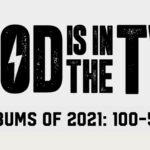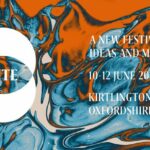Jack Cooper‘s band Modern Nature pursue an exploratory, free flowing path both on record and off, since their conception three or so years ago. Debut album ‘How To Live’ in 2019 provided us a route map of sorts, and found ways to do precisely as the title suggests; last year’s ‘Annual’ explored the seasons. Island of Noise out today drops us off to an island, albeit a metaphorical one. The new record might be more compositional in nature than earlier works but it does not sit in isolation; jazz-inspired arrangements and whispered vocals, fragile and as a dry leaf, ready to crumble, are familiar to those Cooper brings along to accompany him on his creative travels. Although his indie roots are still present – despite himself, maybe – he’s followed his heart and sharpened instincts, creating not only a concept album of depth and imagination, but building a strange yet still familiar world.
Jack has moved literally in real life too, leaving behind the grit and pace of London to the green and clean of the Essex countryside. ‘Island of Noise‘ bridges those two geographical worlds, his past and present, in its very creation. The bare bones written at his former home in Leytonstone and developed and fleshed out and recorded in new rural surroundings, is a mirroring of his own movements, if you like.
‘Yeah, I’m not sure why,’ he says of his propensity for journeying, in his musical output anyway. ‘A lot of the time the reason why I make these records is a way of processing my own worldview, or the way I want to live. It’s difficult to put this stuff into words. So for me to say, “oh, it’s about it’s a record about someone arriving in a new place” would be a way of explaining it, but to me it feels like the scope of it is far wider than that.’
Island of Noise’s beginnings start at Jack’s rediscovery of Shakespeare’s play ‘The Tempest’, the scene where strangers land on a mysterious island, one alive with supernatural sounds and movements. They are assured by an uncharacteristically poetic and gentle Caliban that “be not afeard, the isle is full of noises”. The typically aggressive character warns to not be alarmed at what they may hear, the sounds will not hurt but instead gift pleasure.
‘I think that the island as an analogy is useful, but I think of it as being any sort of unknown space you find yourself in. Whether that is a trying to try and empathise with someone who’s been forced to seek refuge here. But, it can be sort of any situation where you find yourself overwhelmed with the unknown,’ explains Jack.
The record seeks to show the story of the island told as viewed through the eyes of outsiders newly arrived. That feeling of disassociation is something we all feel, in these strange times, these complicated times, these curious times, or indeed these typical times.
‘It could be something as simple as when you go on the underground in London, and it’s like six in the morning, but there are hundreds of people in the carriage with you,’ he suggests. ‘If you actually look at the situation, it’s incredibly dangerous. And no one’s talking to each other. If you weren’t so used to it and conditioned to think it was reasonable you would say it’s a completely insane situation.’
Reading The Tempest, Cooper was struck that the themes explored by Shakespeare hundreds of years ago scarily applicable to contemporary times. Xenophobia being one; as I’m writing this, 26 asylum seekers perished attempting to cross the English Channel in effort to reach the relative safety og our shores, the ‘send them back’ response from government jarring with that of our French neighbours, leading to a stalemate.
‘More than that (the play) seemed to coincide with how I started thinking about our general political discourse and how polarised everything is nowadays,’ Jack says. ‘From my own point of view for us to move on from this point we need to accept that there’s a lot more grey areas and a lot more nuance to most to most political disagreements. I think of myself as really quite far to the left, a socialist and but I think we’ve got to a point where everyone is very, very blinkered.’
This ties in with the unfolding and fallout of Brexit, how there is comfort real or imagined in looking at the past in a nostalgic way. As Jack points out, it’s safe to be human in our society in contemporary times despite COVID and a climate change disaster looming. No wars affect us, we live longer lives in relative comfort; in Shakespeare’s day humans did well to live past the 30 years of suffering.

On Island of Noise, he imagines a changing and evolving landscape on the island, its own journey through time. But also how any new arrivals unfamiliar with its contours and customs and terrain might navigate it physically and emotionally, react and adapt to its ways and inhabitants, navigating inequalities and divisiveness. Finding order within chaos, he talks of finding goodness and positivity around us, not always easy to do during the overwhelming shit thrown at us so much of the time. ‘Finding compassionate people and finding connections with people, I suppose. And I do feel that you can find compassion and connection with people across the majority of the political and social spectrum. I still really, truly believe that. You know, people are nice.’
And connections of like minded souls formed the record itself; long-term collaborators Jeff Tobias and Jim Wallis plus saxophonist Evan Parker, pianist Alexander Hawkins, bassist John Edwards and violinist Alison Cotton.
The ensemble created the record through improvisation, vocal melodies and guitar written by Jack early on. That would be the basis of what long term drummer Jim Wallace, and John Edwards on bass worked on and built a framework, representing the landscape’s shifts and changes. The inhabitants, foliage, forests and valleys imagined by improvisation and classical musicians. ‘I had some set ideas and set orchestration scored out, but we would basically make a canvas for the other people to kind of elaborate on and shape the record I suppose. So the idea really was for them to sort of take these melodies and themes and elaborate on, take them to where they think we should go and we kind of from the how we sort of edited it all down from the from the sort of hours and hours of improvisation. Everyone had the space to improvise.’
I love the concept of recording the album as a sanctuary of sorts, Cooper finding his own order within the mess of last year. Island of Noise recorded with nice people, coming together to create, in a brief respite from the hardness and isolation of lockdowns. ‘For a long time I was in groups and had a career within music to some extent but it’s got to a point especially since Modern Nature began that I had a realisation this is this is my vocation. I’ve got to a point where I realised, well, this is what I do now. With that has come a certain sense of applying myself a lot more and an acceptance of my personal ambitions for the music. To spend a year or something writing and figuring out how to notate and working on it every day. And all that happening within what was going on last year with the lockdowns, it felt like actually getting in the studio was, “this is this is where I’m meant to be”.’
The Modern Nature adventure so far has been quite a ride. Jack refutes suggestion he is especially prolific, despite an impressively regular series of releases. Instead, he prefers to view it as a keener dedication to his own personal creativity. More space and reflection on the records as they progress, Cooper’s pleasure in pushing forward is clear. Island of Noise is accompanies by Island of Silence, instrumental reworkings of the songs.
‘I’m becoming more of the mind that music is a is a far more interesting and far more successful medium to express yourself or communicating with people. I think it’s miles above the written word or language. I think that there’s something in music that is so so important. I generally just feel like I’m moving away from writing words because it doesn’t feel it doesn’t feel like I’m communicating as well as I do when it’s the words on there. So eit isn’t necessarily I think this music’s better without the words. I don’t feel like music’s necessarily better without words but I think it’s just as interesting, arguably more interesting.’
We’re to expect more movement from Modern Nature, then. More change. More exploring. We’d expect nothing less.
Island of Noise is released today 3rd Dec via Bella Union, as a deluxe vinyl box set with accompanying book featuring Booker-nominated poet Robin Robertson, mycologist Merlin Sheldrake, illustrator Sophy Hollington, polymath Eugene Chadbourne and The Lark Ascending author Richard King.




